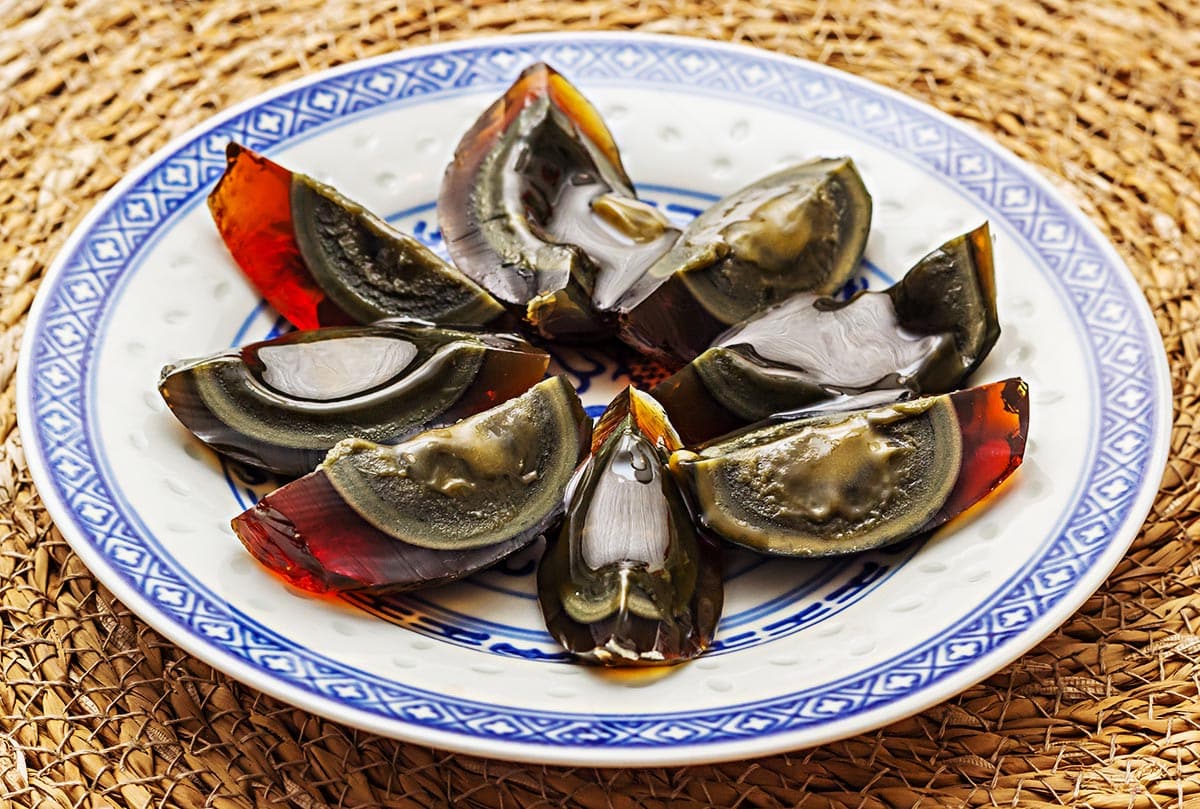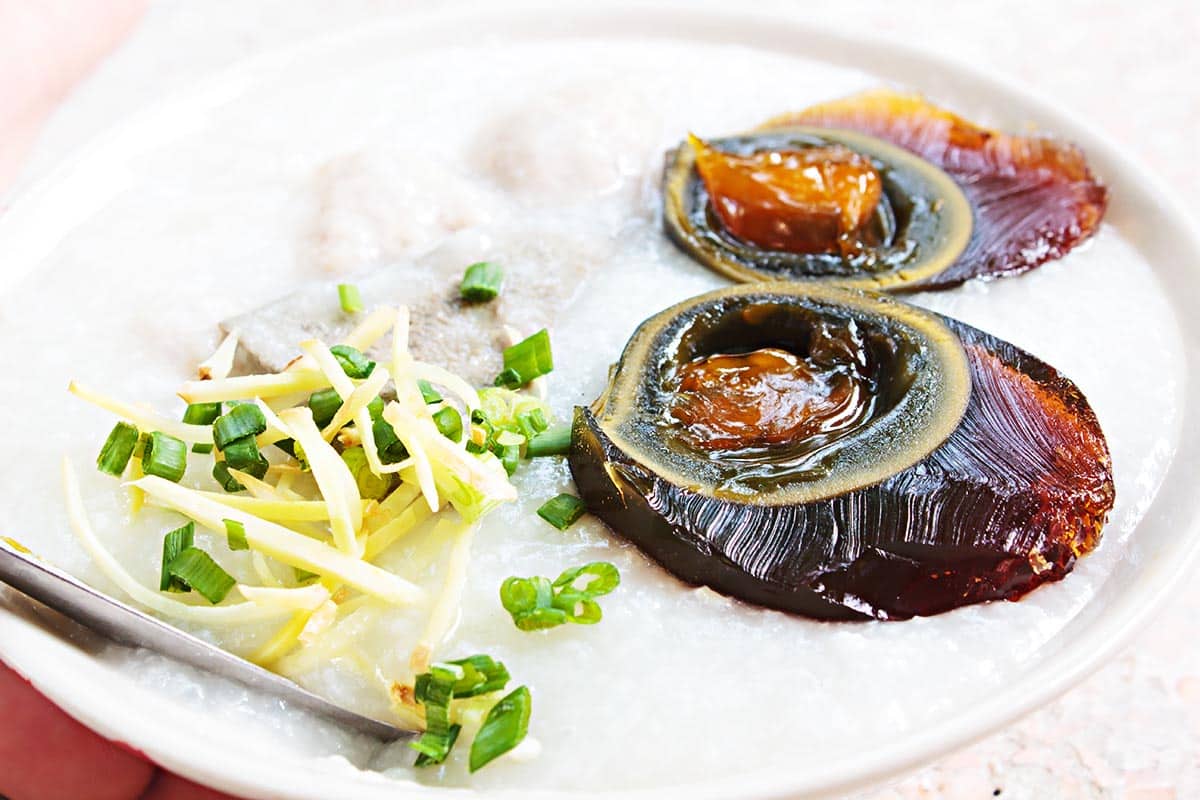Have you ever tried a hundred-year-old egg? There are many questions when it comes to this exotic Chinese dish. For instance, what does a century egg taste like? Luckily, you’ll learn all about this delicacy’s flavors and its curing process in today’s food guide.

Century eggs, or “thousand-year eggs,” are preserved duck eggs. These Chinese delicacies often have dark egg whites and gray or green yolks.
Although duck eggs are popular, some century eggs come from chicken or even quail eggs. “Millennium eggs” or “skin eggs” are other names for century eggs.
Contrary to its name, these preserved eggs only take several weeks to a few months to cure. Thanks to their colors, many have the misconception that century eggs are rotten. But some seek the black egg delicacy for its appearance and the unique patterns on its surface.
Century eggs originate from China and have a long history with their cuisine. Locals believe that the dish first appeared during the Ming Dynasty. There’s a rich folklore surrounding this delicacy that speculates its discovery.
One popular theory retells the story of a man who discovered eggs covered in lime in his backyard. Another story tells the tale of a farmer who left the eggs in the garden of a young woman. Unfortunately, the woman only discovered the eggs two months later.
The most likely reason is that century eggs result from the need for preserving food. Before the modern-day fridge, locals preserved foods using creative methods. In this case, they wrapped the eggs in clay to withstand the harsh winter months.
Century eggs have a complex flavor profile. Their aroma and texture heavily contribute to their overall taste. Before you even taste the egg, you’ll first notice the smell. These eggs have an aromatic scent similar to ripe cheese with hints of ammonia. So, what does a century egg taste like?
Century eggs have rich, salty, and cheesy flavors. Eating these eggs is like biting into a slice of blue cheese.
Thousand-year eggs make perfect pairs for savory and tangy dishes. If you push past the aroma and flavor, the next thing you’ll notice is the texture.
Century eggs have unique contrasting textures. Due to the curing process, the egg yolks turn gray or green. They feel mushy and creamy and quickly melt on the palate.
When you cut open century eggs, you’ll also notice that the egg whites have turned dark green. Their texture is translucent, like jelly. The egg whites also break apart easily when you cut them.
Century eggs have rich nutritional content. Like most eggs, this delicacy is an excellent source of protein. These eggs are low in carbs and only contain 92 calories each. They also have high vitamin D content.
Aside from their unique aroma and flavor, century eggs are also versatile. In China, these eggs are staples from breakfast to dessert. If you have century eggs at hand, there are different ways to serve them.
Here are five easy recipes on how to best enjoy this delicacy.
In Chinese cuisine, congee is a rice porridge dish served during breakfast. You can eat it plain, but it’s also delicious with garnish. Popular toppings include meat strips, tofu, dried garlic, and sliced century eggs. Congee tastes salty, but the eggs add a rich flavor and creamy texture. The porridge’s plain flavor is also a great contrast to the eggs’ pungent taste.
Another delicious way to eat century eggs is to serve them in a salad. You’ll need olive oil, sesame oil, soy sauce, and rice vinegar. We recommend chili peppers, sliced garlic, cilantro, and scallion for garnish. Whisk all the liquid ingredients together and pour over sliced century eggs. Top with preferred garnish, and you’ll have a blend of salty and savory flavors.
Century eggs are also a popular pairing for silken tofu. The latter has a bland flavor but silky and creamy textures. Luckily, the eggs make up for the lack of taste. Mixing soy sauce, vinegar, and sesame oil can also add a savory sauce. Some people prefer heat and add chili peppers and minced garlic. Century eggs and tofu make a perfect combination of creamy texture and cheesy flavor.
Did you know that century eggs also taste great in pastries? When you think of eggs, you’re more likely to pair them with savory dishes. But some food spots in Hong Kong serve preserved eggs stuffed in pastries. Cooks line the pastry sheet with lotus seed paste before wrapping it around a century egg. The result is a delicious mix of sweet, salty, and nutty tastes.
In Cantonese tradition, century eggs play a big role in “lahng-poon” or “cold dish.” It’s a course platter served during birthdays and weddings. It has sliced century eggs with different cuts of meat like pork, abalone, and jellyfish. The platter also serves pickled vegetables, including leeks, carrots, and radishes. You can pick and pair the ingredients, giving a tasty combo of salty, savory, and tangy flavors.

Century eggs have a long lifespan as long as they remain intact. But how can you tell if this delicacy is still safe for eating? Signs may be hard to detect, especially since these eggs already have an unpleasant aroma to start with.
Luckily, there’s one trick you can do to tell the freshness of century eggs.
Get a bowl of water and slowly drop them. If they stay at the bottom, they are fresh eggs. But if they float, it’s a sign for you to throw them out.
As eggs age, the air pockets around their shells grow larger. The bigger the pockets, the more air gets inside. When the insides of an egg come in contact with exposure, it will start to spoil. Rotten eggs, even century eggs, will float to the top when in water.
When unopened, century eggs can last three to five months in storage. Once you peel an egg, we recommend eating it within 24 hours.
You can also keep peeled century eggs in the fridge for one to two days. Remember that these eggs spoil quickly.
We recommend eating them soon after opening.
To extend this delicacy’s shelf life, we suggest keeping them in an airtight container. You can store them in the pantry or fridge.
Only peel the eggs once the need arises. When the eggshell cracks, its freshness quality will start deteriorating.
The answer depends on your preference. These eggs, like caviar, are an acquired taste. The flavor might be off-putting if you’ve never eaten century eggs before. But if you’re fond of blue cheese, this delicacy will be a familiar taste to your palate.
No, you don’t need to cook century eggs. This delicacy “cooks” during the curing process. But you can add it as an ingredient when cooking other recipes.
Yes, century eggs spoil once you peel them. But if they remain unopened, they should last for several months.
The price depends on where you’re buying the century eggs. In Asian countries, these eggs are affordable and readily available in stores. But it may be more expensive in the United States, where it’s not a familiar dish.
Preserve eggs in an airtight container and store them in the fridge.
Century eggs are a unique delicacy originating from China. To make this dish, locals salt duck eggs and preserve them in clay molds for several weeks or months. When you slice open a century egg, you’ll see a gray, creamy egg yolk. The egg white is also dark green and gelatinous.
Regarding flavor, the century egg taste is just as unique as its looks. The eggs have a strong aroma similar to cheese and an extremely salty taste. The egg yolk is creamy, while the egg white is soft and cuts easily like jelly. Century eggs taste delicious in congee, salads, and silken tofu.





